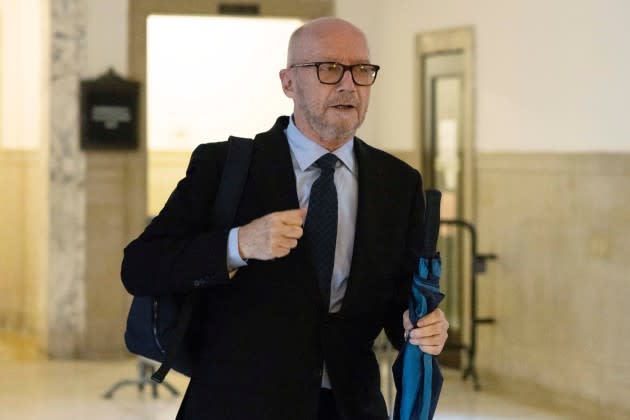
UPDATED with afternoon session: A woman who said filmmaker Paul Haggis “attacked” her in 2008 during a meeting in his office in Los Angeles said she stood up and backpedaled through an emergency exit door with her hands up and her eyes peeled on Haggis as he kept “trying to grab” her until she got to the curb outside and to safety.
“I was terrified that I was not going get out of that office that night,” the woman, who Deadline is not identifying, testified in a videotaped deposition from 2019 that jurors in Manhattan watched Tuesday in the sexual assault civil trial brought by Haleigh Breest, who accuses the Oscar-winning screenwriter of raping her in 2013 at his apartment in New York City and wrapped up her testimony earlier in the day.
More from Deadline
Related Story
Paul Haggis Accuser‘s Graphic Texts From Day After Alleged Rape Shown To Jury: “I Kept Saying No” – Update
Related Story
Harvey Weinstein L.A. Rape Trial: Accuser Says She Felt Like She “Wanted To Die” During Alleged 2013 Assault; Judge Will Allow Former Assistant To Testify
Related Story
Harvey Weinstein L.A. Rape Trial: Accuser Tearfully Recounts Alleged Assault; Defense Attorney Calls Sexual Encounters “Transactional” On Day 1
The woman, a journalist from Canada who was on a work trip to Los Angeles, stayed in touch with Haggis for months after fleeing what she called a “violent” attempt by him to initiate sex in his office, and she enlisted him to recommend her for a U.S. work visa.
She is one of of four Jane Does that Breest’s lawyers are calling in support of their case, and she said that in the moment, she feared she was about to be raped. “I felt like if that happened I would never be the same person again,” she said.
She is the second native of Canada, after a Jane Doe who testified in person on Monday, to say that their interactions with Haggis — that country’s most famous filmmaker — turned rapidly from pleasant to threatening when they were alone with him.
At a 9 p.m. meeting in 2008, she testified, Haggis poured them both red wine — which she said she didn’t drink — and within minutes steered the conversation from a book adaptation she had driven there to discuss to an understanding that he said he had with his then-wife allowing him to pursue sex outside their marriage.
The witness said she tried to get him talking about his kids. “I just went into sort of reporter mode,” she said, adding, “Because I could tell that the mood had changed and I was uncomfortable.” She said Haggis’ demeanor, even when talking about his family, had changed. “It was very cold,” she said. She was beginning to find the situation scary enough that she made a mental note of her car keys being in her purse, she testified.
Then he said, “I want to be inside you,” came out of his seat and around the table separating them, grabbed her by the arms and tried to kiss her, she testified. “It was not romantic. It was not a pass,” she said. “It was violent.”
She said she turned her head to avoid the kiss, said “no” and that she had a boyfriend, and went backward out an exit door using her hands to fend him off because she was too scared to turn her back to him. He followed her to the curb, where she crossed the street, climbed into her car, locked all the doors, and waved good-bye to him as she executed a U-turn and pulled away, she testified.
She said she tried calling her sister, who lived in Canada in a later time zone, from the car as she drove back to the house of a friend she was staying with, but at first couldn’t reach her, or her friend, who was not at the home. She said she finally reached her sister and kept her on the line until she reached the house. “I told her, ‘I just got attacked and I got away,’ ” she said.
Haggis sent her an email soon after, saying in part, “Can I tell you how much fun it was to to sit and talk to you tonight and and share a glass of wine? … Hope you aren’t too spooked by the Me and the surprise of it all … I’m just really f***ing intrigued and can’t wait to see you again. As promised, missed you the second I closed your car door.”
The woman called it Haggis’ “apology e-mail” and his way of setting a narrative in case he was asked about the encounter. She said he wasn’t the one to close her car door, and she didn’t reply. But she did respond to another e-mail, and remained in touch with him about the book adaptation idea and her visa application.
Cross-examined by a Haggis lawyer, Priya Chaudhry, she said in the deposition that in the emails setting up their meetings in Los Angeles she only talked about “career opportunities” and not the proposal for a screen adaption of a Canadian novel she loved. But she said that part was implicit since it was an ongoing part of their conversations from the time they had met in 2007, after she interviewed Haggis for Canadian television.
The witness said her goal from the day of the incident onward was to not anger Haggis or have him thinking she would go public. “I wanted to have a polite professional relationship with him going forward,” she said.
She didn’t tell people she worked with in media about the attack, she testified, because Haggis was a powerful, influential and beloved figure for his movies and his philanthropy. “He seemed to be attached to all the right causes,” she said.
“I was terrified that he would ruin my career,” she said.
She decided to come forward, but as a Jane Doe, to support Breest’s lawsuit and partly out of outrage that Haggis, of all people, had publicly called Harvey Weinstein a “predator” after the revelations that sparked the #MeToo movement.
“And the hypocrisy of somebody like that,” she said. “I just couldn’t believe he would say that publicly.”
“And you don’t just attack one person like that in your life,” she said of her encounter with Haggis. “That’s just not how this works.”
PREVIOUSLY, 12:05 PM: Haleigh Breest finished testifying Tuesday in her sexual assault civil trial against filmmaker Paul Haggis, and jurors began watching the video deposition of another Haggis accuser who has said she went to his office in Los Angeles in 2008 to discuss a possible book adaption and wound up fleeing the building when he suddenly tried to kiss her.
Breest spent nearly 10 hours total in the witness box over four days in an old Manhattan courtroom being cross-examined by a lawyer for Haggis, Priya Chaudhry. Today, Breest was again confronted with texts that didn’t characterize what allegedly happened between her and Haggis as rape, and she was asked why she never went to the police and never sought a sexual assault forensic examination, often referred to as a “rape kit.”
Breest is suing Haggis claiming he raped her in his apartment in Soho in 2013 after a movie screening party put on by Breest’s boss, which Haggis attended and where Breest was working as a freelance events publicist. Haggis has said the sex was consensual. Breest testified today that she feared police would mishandle a rape investigation, and she kept the tights she wore to work that night — the ones she said Mr. Haggis ripped from her legs — in a designer cloth bag in the back of a dresser until she filed the lawsuit.
“You understand that you could go to the police right now if you wanted to?” Chaudhry said, noting that New York recently removed the statute of limitations for rape.
“Are you worried that the police won’t believe you because of the text messages?” Chaudhry asked.
“No,” Breest said.
“But instead you’re going to ask this jury to give you Mr. Haggis’ money?”
“Yes,” she replied.
On Monday, Chaudhry showed jurors texts by Breest to a friend the day after she was at Haggis’ apartment referencing The First Wives Club, the 1996 movie comedy about a group of jilted spouses getting revenge on their ex-husbands in part by bankrupting them. “I just want to get even and not be the victim,” she wrote, adding, “As they said in first wives club Don’t get mad get everything.”
On Tuesday, Chaudhry raised another piece of ’90s pop culture referenced in the texts: the song “Stupid Girl” by the rock band Garbage, whose “stupid girl” refrain Breest said she had in her head after her experience with Haggis. Chaudhry read aloud some of the lyrics including, “All you had you wasted,” “I can’t believe you fake it,” and “You pretend you’re high/Pretend you’re bored/Pretend you’re anything/Just to be adored.”
“That’s the song you wanted to play over and over after leaving Mr. Haggis’ apartment?” she asked. Breest emphasized that she just meant the refrain.
In a last brief round of friendly questioning, a Breest lawyer, Zoe Salzman, pulled the long black Sandro dress Breest wore that night out of a plastic zippered bag and held it up on a hangar in view of jurors. “Did the dress rip when Mr. Haggis pulled it off of you?” Salzman asked. “No,” Breest replied.
Breest said that filing a civil case gave her “a sense of control in the process” — which she didn’t believe she would have with a police-led criminal investigation — to counteract “the loss of control of my own body” she said she experienced in being raped.
“Why are you here, Ms. Breest?” Ms. Salzman said.
“Because Mr. Haggis should be held accountable for the harm he caused me,” she said.
Over objections from Haggis’ lawyers, Breest’s lawyers called a friend, Lola Miller, who testified that at a dinner in September 2013, Breest told her she had been raped by Haggis. Haggis’ lawyers said the time lag — eight months — was too great to qualify Miller as a so-called “outcry witness” who provides a contemporaneous account of the accuser’s claim. The judge, Sabrina Kraus, said they should have objected to Miller testifying before the trial.
Miller said Breest told her Haggis had “overpowered her,” and she recalled Breest telling her that “her tights were ripped.” A defense lawyer, Seth Zuckerman, returned to that point on cross-examination, since it appeared to contradict Breest’s own testimony that the tights were pulled off violently but didn’t rip.
In a follow-up email that month, Breest wrote, “What happened wasnt ok but it happened. It was somewhat traumatic at the time but I’m well past that thankfully!” Miller wrote back that she was “Always here for you,” she testified, “Because I didn’t believe she was okay.”
Before lunch, jurors began hearing the video testimony of the second Jane Doe called by Breest’s lawyers with an account of an attempt by Haggis to initiate sex. Jane Doe #2, who gave her deposition in 2019, said she met Haggis in 2007 at the Toronto Film Festival which she was covering for Canadian television news. After interviewing Haggis, she hoped to interest him in adapting a favorite Canadian novel of hers for film or television. They met again in April 2008 in Los Angeles to discuss the project — the first time at a cafe in Santa Monica where Jane Doe #2 also met Haggis’ wife and his producing partner.
The next meeting to discuss adapting the book took place the following night at his office in Los Angeles. The woman testified that when she first arrived for the 9 p.m. meeting, the office was still bustling, but later, after she was led to a seating area where she saw there was wine, the lights dimmed and the building emptied out, and once the meeting started, “Very quickly I could tell Mr. Haggis wanted to have a more personal conversation.”
“He wanted to talk about his relationship with his wife,” she said.
Best of Deadline
Sign up for Deadline’s Newsletter. For the latest news, follow us on Facebook, Twitter, and Instagram.




